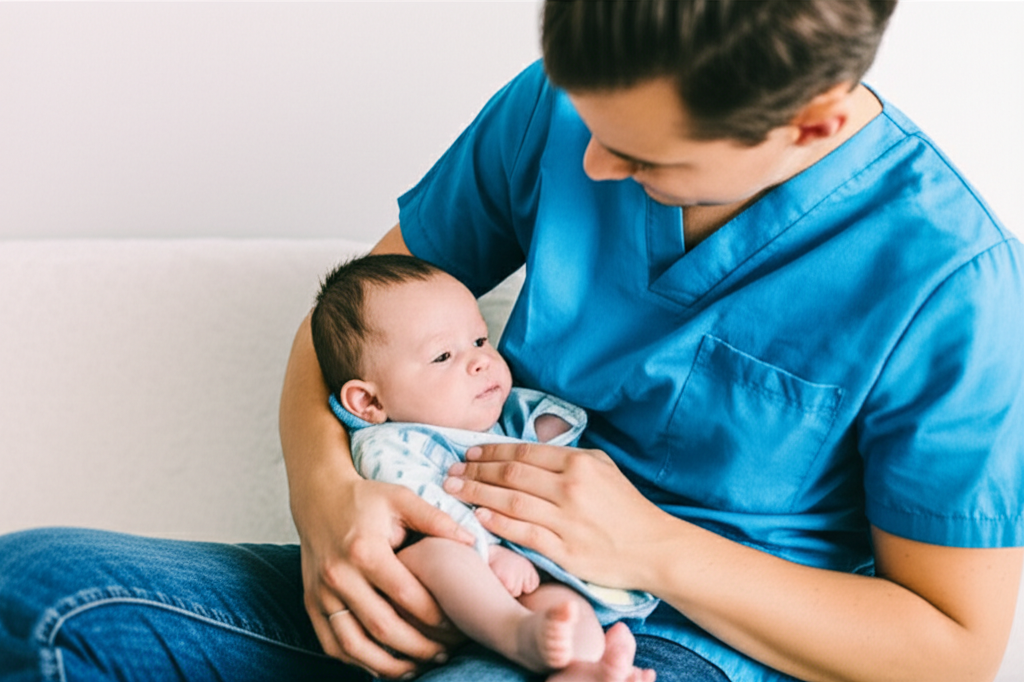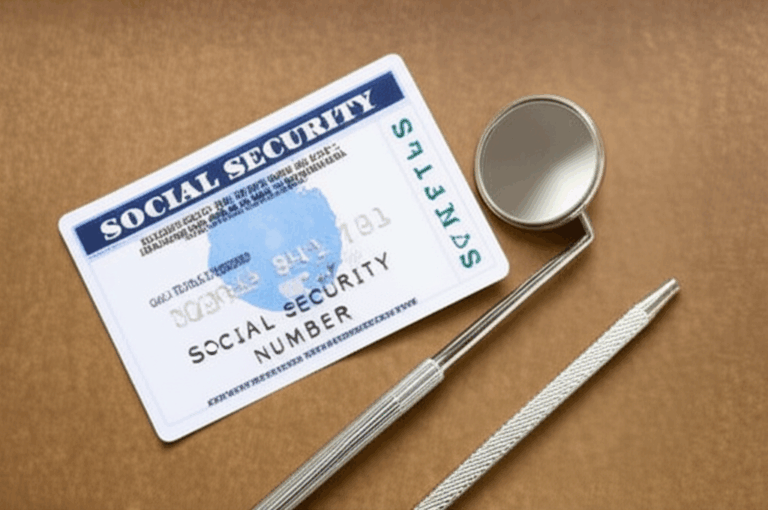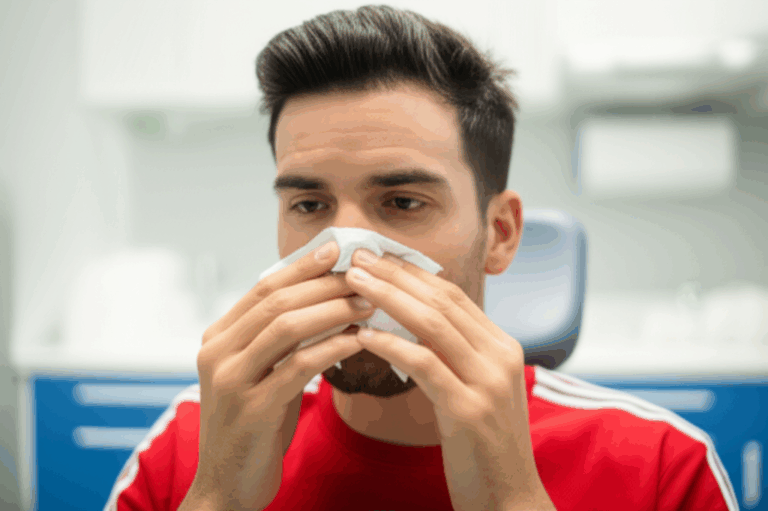
When Should Your Infant First Visit the Dentist? A Simple Guide for New Parents
Wondering when to take your baby to the dentist? You’re not alone. As a parent, I once sat at the kitchen table looking at my baby’s first tiny tooth and asking myself that same question. In this easy guide, you’ll get answers. We’ll clear up myths, share advice, and help you get ready for your baby’s first dental appointment. Early dental care is one of the best things you can do for your child’s health. Let’s get started!
Table of Contents
Why Do Babies Need to See the Dentist So Early?
Let’s talk about something most parents wonder: Isn’t the dentist just for bigger kids with more teeth? Actually, starting good dental habits begins when your baby’s first tooth shows up.
Lots of people think baby teeth don’t matter much since they fall out. But here’s the thing: if these teeth get cavities, it can cause pain, infections, and even hurt the grown-up teeth waiting to come in. The CDC says about 1 in 5 kids aged 2-5 gets a cavity in their baby teeth. That’s a lot of kids with toothaches and difficult dental visits that could have been easier.
Ignoring those little teeth can turn into big, expensive trouble later—like pain, missed school, trouble eating, and bigger dental costs. Going to the dentist early helps catch problems soon and keeps your baby’s smile healthy.
What Age Should I Take My Infant to the Dentist?
Here’s the straight answer: Take your baby to the dentist by their first birthday, or within six months after the first tooth comes in. This isn’t just my idea, but what the American Academy of Pediatric Dentistry (AAPD), American Dental Association (ADA), and the American Academy of Pediatrics (AAP) all say. Some parents ask, “Isn’t that too soon?” Nope!
What I did with my first kid: Their bottom tooth showed up at seven months, so I made a dentist appointment before their first birthday. The dentist checked everything out and gave me tips I wish I’d known earlier. If you want to stop cavities before they start, this is the right time.
Why so early? The dentist can:
- Check how the mouth and jaw are growing
- Show you how to brush baby teeth
- Look for early signs of problems
If your child’s first tooth is late, don’t wait. Go by their first birthday, even if there aren’t teeth yet.
What Is a “Dental Home” and Why Does It Matter?
At your first visit, you might hear the phrase “dental home.” But what does it mean? Think of it as the dental office your child goes to for all their tooth care—the people know your family, and you can ask anything.
Getting this started early means:
- You get advice just for your baby
- Small problems won’t turn into big ones
- Your child gets used to the dentist and isn’t scared
A dental home helps your child smile for life. It’s just like having a favorite doctor, but for teeth!
Are Early Dental Visits Really Important? Here’s Why.
You might wonder, “Do I really need to go this soon?” I get it. But studies show: Early visits stop cavities, pain, and big costs.
Take Early Childhood Caries (ECC)—also known as “baby bottle tooth decay.” It comes from letting your baby have sweet drinks or milk often, especially at bedtime. Bad bacteria make acids that attack the outside of teeth, causing cavities. And yes, these baby teeth can rot faster than you might think. Cavities left alone can lead to infection, pain, or even trouble talking or eating right.
Did you know? Dental cavities are the most common long-term disease in kids—way more than asthma! That surprised me. But here’s good news: Kids who go to the dentist early spend about 40% less at the dentist later. That saves money and stress!
Early visits don’t just stop cavities. They help the dentist see if teeth are coming in right, or if your baby has tongue-tie or lip-tie—and fix things early.
What Happens at the First Dentist Appointment?
Going to a new place with your baby can feel scary. Here’s what usually happens at the first dentist visit:
Don’t worry—you won’t be judged. Staff know all parents are learning. It’s about making things happy and easy for you and your baby.
How Can I Prepare My Baby (and Myself) for the Visit?
Making the first visit smooth is easy with a bit of planning:
- Pick a Good Time: Go when your baby is rested and full. Mornings are good, but use whatever works for your child.
- Bring Comfort: Your child’s favorite toy, stuffed animal, or blanket can help them feel safe.
- Stay Relaxed: Babies notice how you feel. If you’re calm, they will be too.
- Talk About It: Even small babies like to hear you say, “We’re going to see the tooth doctor. It’ll be fun!”
- Dress Comfortably: Pick clothes that make it easy for the dentist to look in your baby’s mouth.
Choose a pediatric dentist who:
- Sees a lot of babies
- Has a friendly staff
- Has an office for little kids
For more advanced care, many clinics use new digital tools from leading digital dental lab partners for safer, easier exams and the best dental work.
What If My Child Doesn’t Have Teeth Yet?
No teeth by the first birthday? That’s okay! This happens more often than you may think. You should still go to the dentist at one year old. The dentist will check the gums, see if the mouth is growing well, and answer your questions. This visit helps you get started with good habits.
If there’s a reason teeth are taking longer to come in, the dentist will find out and help you plan for it.
How Often Do Babies Need Checkups After the First Visit?
After the first visit, most kids should see the dentist every six months. But if your child is at higher risk for cavities, your dentist may ask you to come more often.
| Age | Visit Frequency |
|---|---|
| 1 Year | First Visit |
| 18 Months – 2 Years | Every 6 Months |
| Preschool+ | Every 6 Months |
Regular visits help the dentist spot problems while they’re still small, clean the teeth with fluoride, and keep you up to date on teething and brushing.
Is Fluoride Safe for Infants?
Short answer: Yes, if you use it the right way. Fluoride is a mineral that makes tooth enamel stronger. Your dentist may put a thin fluoride coating on your baby’s teeth. It’s quick, doesn’t hurt, and helps stop cavities as your child grows.
At home, when your baby gets their first tooth, use a dab of fluoride toothpaste about the size of a grain of rice. Don’t let your child eat the toothpaste. Always help them brush.
If you’re not sure about fluoride in your water, or if your child has special needs, just ask your dentist.
How Should I Clean My Baby’s Gums and Teeth?
Even before teeth show up, gently clean your baby’s gums using a soft, wet cloth or a finger brush after feedings. When teeth come in, use a soft kids’ toothbrush.
Steps for easy cleaning:
Look for white or brown spots, redness, or swelling. If you see anything odd, call your dentist.
For special things like retainers or night guards, modern clinics work with trusted providers like dental lab for retainers to protect growing teeth.
Common Parent Worries and How to Solve Them
1. My baby has brown or white spots on their teeth.
This might mean early cavities or enamel problems. Call for a checkup soon.
2. My child sucks their thumb—is this bad for teeth?
Sucking thumbs after age 2 can move teeth. The dentist will show you gentle ways to help stop the habit.
3. My baby cries at the dentist!
Lots of babies fuss at first. Kids’ dental teams know lots of tricks to help them calm down.
4. What about a dental emergency?
If a tooth gets knocked out, put it in milk and call the dentist right away. Dental offices that use china dental lab services can make fast, custom fixes if you need them.
Internal Solutions: How Modern Labs Support Healthy Smiles
Behind every healthy child’s smile is a team that helps. Good dental labs make crowns, retainers, and appliances that dentists use for growing kids’ teeth. These labs—like dental ceramics lab—use the best, safe materials.
Today’s labs use:
- Accurate digital tools for the perfect fit
- Safe, non-toxic materials for babies and kids
- Custom shapes for growing jaws and teeth
If your dentist says your child needs a mouthguard, crown, or other dental thing, ask what materials they use and which lab. You want a lab that cares about safety and comfort—just like you do!
FAQs
Q: What if my baby hasn’t gotten their first tooth by age one?
A: That’s fine. Go to the dentist anyway. The dentist checks growth and answers your questions.
Q: Are baby teeth really that important?
A: Yes! Baby teeth help your child talk, eat, and save space for grown-up teeth.
Q: How do I stop bottles from giving my baby cavities?
A: Don’t let your baby sleep with a bottle of milk or juice. Only water is safe at bedtime.
Q: When does thumb sucking start to be a problem?
A: After age 2, thumb sucking might move the teeth. Your dentist will help you break the habit in a kind way.
Q: Can cavities in baby teeth hurt adult teeth?
A: Yes. Bad baby teeth can spread germs to new grown-up teeth and cause pain.
Bullet Summary: Key Things to Remember
- Schedule your baby’s first dentist visit by age one or when the first tooth comes in.
- Early checkups stop pain, cavities, and bigger dental troubles.
- A “dental home” means support and answers for your child.
- Clean your child’s gums and teeth every day with a soft brush or cloth.
- Use a tiny bit of fluoride toothpaste—just the size of a rice grain.
- Watch for white/brown spots or swelling on teeth or gums.
- Don’t let your baby sleep with bottles of milk or juice.
- Visit the dentist every six months, or as your dentist suggests.
- Pick a dentist—and dental lab—who cares about gentle, safe care.
- Have questions? Talk to your dental team. They want to help you keep your child smiling!
Reviewed by Dr. Joe Dental, Pediatric Dentistry Specialist.
References:
For the healthiest start, don’t delay—smiles start from day one!








